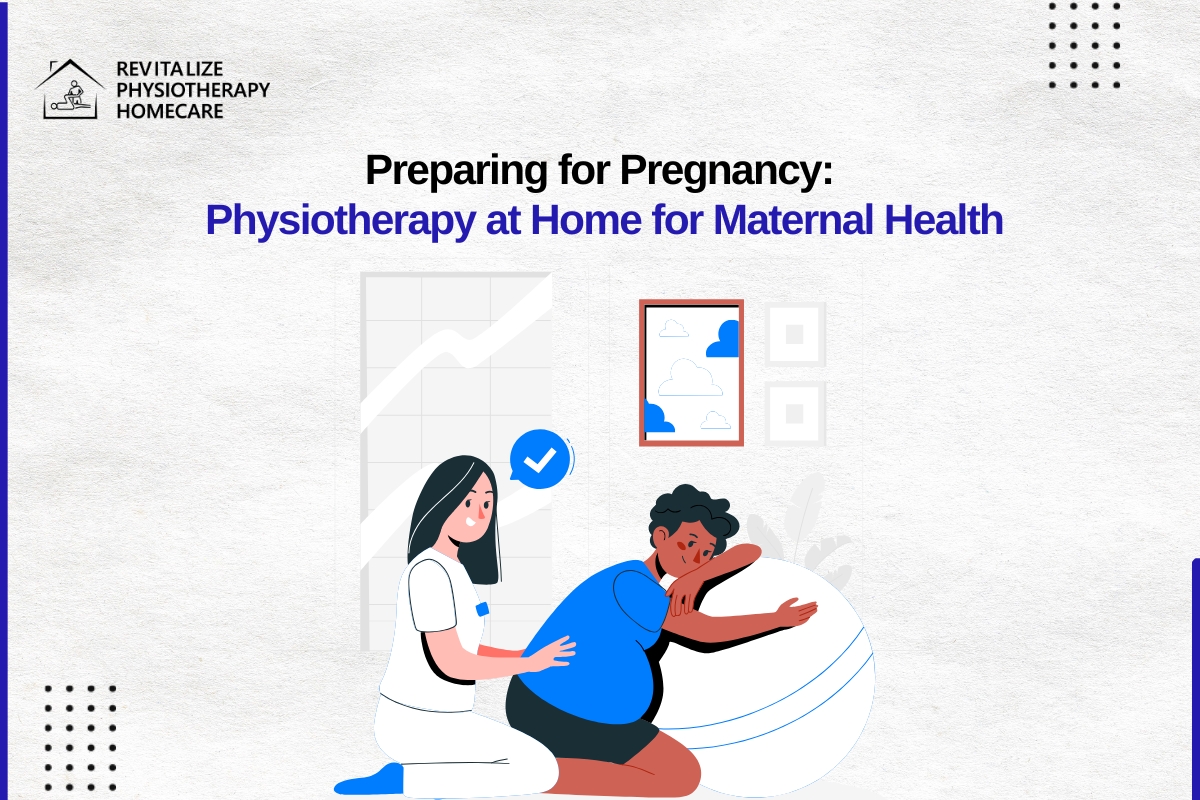Preparing for Pregnancy: Physiotherapy at Home for Maternal Health
Preparing for pregnancy involves many aspects of health and wellness, and physical readiness is a key factor. As the body undergoes various changes during pregnancy, building strength and maintaining flexibility can help support a smoother journey. Physiotherapy at home offers a convenient and effective way for expectant mothers to strengthen essential muscle groups, reduce common discomforts, and improve overall maternal health.
In this blog, we’ll explore how physiotherapy can play a vital role in pregnancy preparation, with specific exercises and techniques that can be easily done at home.
Why Physiotherapy Matters in Pregnancy Preparation
Pregnancy places new demands on the body, from changes in posture and balance to increased strain on muscles and joints. Physiotherapy can help the body better adapt to these changes by preparing the core, pelvic floor, and other important muscle groups.
- Core Strength: Strengthening the core muscles helps support the spine and reduce back pain, a common issue in pregnancy.
- Pelvic Floor Health: The pelvic floor supports the bladder, bowel, and uterus, making it essential for preventing discomfort and maintaining control over bodily functions.
- Improved Mobility: Flexibility exercises ensure the body remains mobile, reducing stiffness and pain as the baby grows.
Let’s have a look at how you can easily integrate physiotherapy into your routine at home.
The Benefits of At-Home Physiotherapy for Maternal Health
At-home physiotherapy is both practical and effective, especially during pregnancy. Exercising at home provides comfort, privacy, and the flexibility to fit sessions into your daily schedule without the need to travel.
- Convenience: You can practice exercises at your own pace, without worrying about commuting to a clinic.
- Comfortable Setting: Exercising in a familiar environment reduces stress and allows you to modify movements to suit your comfort level.
- Better Consistency: When exercises are convenient and accessible, you’re more likely to stay committed, which is essential for long-term benefits.
With these benefits in mind, let’s dive into specific exercises that support maternal health.
Essential Physiotherapy Exercises for Pregnancy Preparation
Here are some key exercises that can be practiced at home to support a healthy pregnancy. These exercises are focused on strengthening the core, pelvic floor, and lower back while improving flexibility and overall stability.
a) Pelvic Floor Exercises
Throughout pregnancy, the pelvic floor muscles are crucial for supporting the uterus. Strengthening these muscles can help manage discomfort, prevent incontinence, and support labor and delivery.
- Kegel Exercises: Sit comfortably and squeeze the muscles you would use to stop urine flow. Hold for 5 seconds, then release. Repeat 10-15 times daily.
- Bridge Pose: Start in bridge pose by lying on your back with your feet firmly planted and your knees bent. Squeeze your glutes and contract your pelvic floor as you raise your hips towards the ceiling. After five to ten seconds of holding the pose, carefully move back to the beginning position.
Now that we’ve covered pelvic floor exercises, let’s look at some core strengthening exercises.
b) Core Strengthening Exercises
A strong core provides essential support for your spine and helps alleviate back pain. Strengthening these muscles will help maintain posture as the baby grows and alleviate strain on the lower back.
- Modified Plank: Place your hands and knees on the floor, maintaining a straight back and an engaged core. Maintain this position for 10-15 seconds, concentrating on core stability.
- Side-Lying Leg Lifts: Lie on your side, using your arm to support your head comfortably. Lift the top leg upwards, engaging your core and hip muscles. Repeat 10-12 times on each side.
After focusing on the core, let’s explore flexibility exercises to keep the body supple and mobile.
c) Flexibility and Mobility Exercises
Flexibility exercises help relieve tension, improve posture, and prepare the body for changes in weight distribution during pregnancy.
- Cat-Cow Stretch: Start on your hands and knees. Arch your back upwards (cat pose), then dip it downwards (cow pose), moving slowly. This stretch helps release tension in the spine while enhancing flexibility.
- Seated Forward Bend: Place your legs straight out in front of you while sitting on the floor. Reach forward gently, extending your arms towards your feet to stretch your hamstrings and lower back.
With these flexibility exercises in mind, let’s now look at some exercises that specifically target the back muscles.
d) Lower Back Strengthening Exercises
Lower back pain is common in pregnancy, but strengthening the back muscles can help reduce discomfort. These exercises support the spine and enhance overall balance.
- Bird Dog: Begin on your hands and knees, extending one arm forward and the opposite leg backward. Pause for a few seconds, then switch to the other side. This movement helps build strength in both the lower back and core muscles.
- Wall Sits: Slide down until your knees are at a 90-degree angle while leaning on a wall. Hold for ten to fifteen seconds. Legs and the lower back are strengthened by this workout.
After covering these essential exercises, let’s discuss the importance of consistency in practicing physiotherapy at home.
Staying Consistent with At-Home Physiotherapy
Being consistent with these exercises helps you get the maximum benefit. Regular physiotherapy can help prepare the body for the physical demands of pregnancy and delivery. To maintain a routine:
- Schedule a Time: Set aside time each day for your exercises, even if it’s just 15-20 minutes.
- Listen to Your Body: Only do what feels comfortable and adjust movements if needed.
- Stay Motivated: Remember that every session contributes to a healthier pregnancy journey.
Now, let’s summarize how physiotherapy can support maternal health and prepare the body for pregnancy.
Conclusion
Preparing for pregnancy with Physiotherapy at Home provides an effective way to strengthen essential muscle groups, improve flexibility, and maintain overall health. These exercises not only help manage discomfort but also build a foundation of physical readiness that can make pregnancy smoother and more enjoyable. By integrating pelvic floor, core, flexibility, and lower back exercises into your routine, you’re setting yourself up for a healthier pregnancy and a more resilient body.
At Revitalize Physiotherapy and Homecare, we specialize in creating personalized exercise plans that meet the needs of expectant mothers. Reach out at 905-452-0222 or mail us at revitalizephysio@gmail.com to get started with safe and effective in-home physiotherapy for maternal health.




